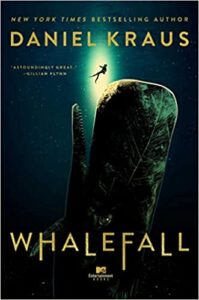 Daniel Kraus’ novel, WHALEFALL, was reviewed by the HWA’s Mental Health Initiative Notable Works readers.
Daniel Kraus’ novel, WHALEFALL, was reviewed by the HWA’s Mental Health Initiative Notable Works readers.
On its surface, WHALEFALL is a story of Jay Gardiner, a young man swallowed by a sperm whale. His determination to escape the whale is charted on one timeline, while the backstory of significant life events is traced on another. Jay is Jonah, his old self annihilated in the belly of the beast, and his biblical journey becomes something deeply personal. The dive is not just into the ocean, but into the unexplored depths of Jay’s depression, grief, survivor guilt, abuse, and most importantly, reaction to suicide.
Jay grows up near Monterey, California under the shadow of his domineering father, Mitt, a local legend in the scuba diving community, despite repeated job failures and the strain he places upon his family. The relationship between Jay and his father deteriorates over the years until Jay leaves home as a new darkness infiltrates his family.
Without giving too much away, Daniel explores the themes of depression and suicide through a highly crafted narrative. Instead of focusing upon a single event, the story slowly evolves the experience of depression over time and across many areas: financial, emotional, vocational, and interpersonal, creating an authentic portrayal of this experience. Daniel sidesteps over-simplification as well as triggering events by not focusing on one reason behind the experience of depression.
Daniel’s handling of suicide is likewise commendable. He avoids immersing the reader into the dramatic action of the event itself, but rather, calls upon a secondary character to deliver the news to Jay. This strategy conforms with contemporary trends of not describing suicidal events in detail due to their triggering natures.
Overall, Daniel Kraus treats these themes with a delicate, realistic hand. Should the book have a trigger warning? Perhaps. Having to say only “perhaps” speaks to how well this book deals with mental and emotional illness.
Some readers may see themselves reflected in Jay’s story—especially those who have been directly touched by these themes. Within the depths of the sea and swells of Jay’s recollections of his relationship with his father, the story offers landmarks for the hidden-most aches some of us may scarcely know how to articulate. Daniel’s story may draw us down into the points Of our most abandoned places and yet, he also leads us into shades of redemption, and even quiet triumph. We may recall our own unique paths of grief, and our need to resist the pressure to grieve as others say we should, because only then, after the painful transformation, can we get to the other side.
The poetic and philosophical elements serve as invitations for those who know complicated grief, and whose memories are tainted by dark and devilish things, but the familiarity of Jay’s experience invites us to seek balance in our own stories, as we too, lift them from the belly of the whale.
Highly recommended, WHALEFALL certainly does not glamorize suicide, but shows how it leaves behind so many unanswered questions. In WHALEFALL, a son bears the heavy burdens of his father. It celebrates the perseverance of the human spirit, even if it breaks our bodies apart along the way.
WHALEFALL whispers of John Steinbeck’s Cannery Row, William Faulkner’s As I Lay Dying, and Herman Melville’s Moby Dick. Like William Blake’s invitation “to see the world in a grain of sand,” it is both cosmic and intimate. WHALEFALL is an act of devotion and a gift. To connect with its gaze is to connect with ourselves.
—L.E. Daniels, Mark Matthews, & Brian Matthews

